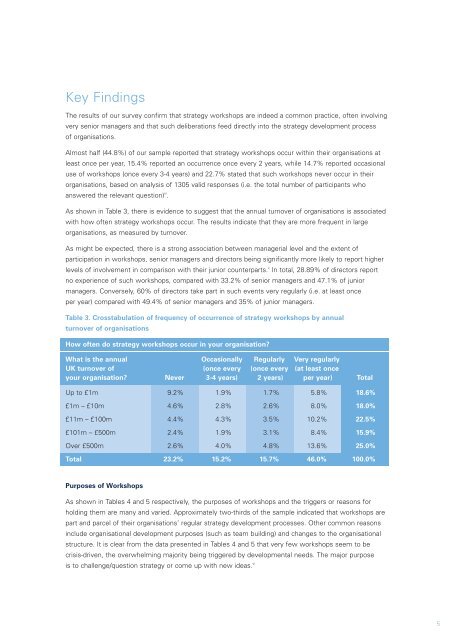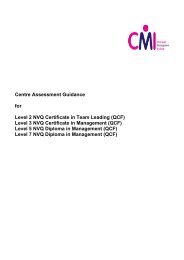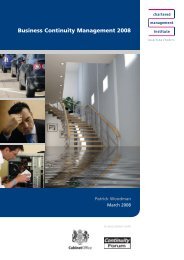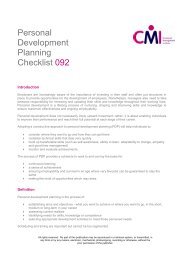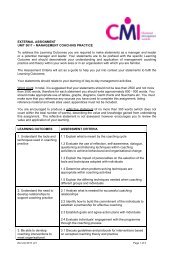The Role and Importance of Strategy Workshops - (AIM) Research
The Role and Importance of Strategy Workshops - (AIM) Research
The Role and Importance of Strategy Workshops - (AIM) Research
You also want an ePaper? Increase the reach of your titles
YUMPU automatically turns print PDFs into web optimized ePapers that Google loves.
Key Findings<strong>The</strong> results <strong>of</strong> our survey confirm that strategy workshops are indeed a common practice, <strong>of</strong>ten involvingvery senior managers <strong>and</strong> that such deliberations feed directly into the strategy development process<strong>of</strong> organisations.Almost half (44.8%) <strong>of</strong> our sample reported that strategy workshops occur within their organisations atleast once per year, 15.4% reported an occurrence once every 2 years, while 14.7% reported occasionaluse <strong>of</strong> workshops (once every 3-4 years) <strong>and</strong> 22.7% stated that such workshops never occur in theirorganisations, based on analysis <strong>of</strong> 1305 valid responses (i.e. the total number <strong>of</strong> participants whoanswered the relevant question) iv .As shown in Table 3, there is evidence to suggest that the annual turnover <strong>of</strong> organisations is associatedwith how <strong>of</strong>ten strategy workshops occur. <strong>The</strong> results indicate that they are more frequent in largeorganisations, as measured by turnover.As might be expected, there is a strong association between managerial level <strong>and</strong> the extent <strong>of</strong>participation in workshops, senior managers <strong>and</strong> directors being significantly more likely to report higherlevels <strong>of</strong> involvement in comparison with their junior counterparts. v In total, 28.89% <strong>of</strong> directors reportno experience <strong>of</strong> such workshops, compared with 33.2% <strong>of</strong> senior managers <strong>and</strong> 47.1% <strong>of</strong> juniormanagers. Conversely, 60% <strong>of</strong> directors take part in such events very regularly (i.e. at least onceper year) compared with 49.4% <strong>of</strong> senior managers <strong>and</strong> 35% <strong>of</strong> junior managers.Table 3. Crosstabulation <strong>of</strong> frequency <strong>of</strong> occurrence <strong>of</strong> strategy workshops by annualturnover <strong>of</strong> organisationsHow <strong>of</strong>ten do strategy workshops occur in your organisation?What is the annual Occasionally Regularly Very regularlyUK turnover <strong>of</strong> (once every (once every (at least onceyour organisation? Never 3-4 years) 2 years) per year) TotalUp to £1m 9.2% 1.9% 1.7% 5.8% 18.6%£1m – £10m 4.6% 2.8% 2.6% 8.0% 18.0%£11m – £100m 4.4% 4.3% 3.5% 10.2% 22.5%£101m – £500m 2.4% 1.9% 3.1% 8.4% 15.9%Over £500m 2.6% 4.0% 4.8% 13.6% 25.0%Total 23.2% 15.2% 15.7% 46.0% 100.0%Purposes <strong>of</strong> <strong>Workshops</strong>As shown in Tables 4 <strong>and</strong> 5 respectively, the purposes <strong>of</strong> workshops <strong>and</strong> the triggers or reasons forholding them are many <strong>and</strong> varied. Approximately two-thirds <strong>of</strong> the sample indicated that workshops arepart <strong>and</strong> parcel <strong>of</strong> their organisations’ regular strategy development processes. Other common reasonsinclude organisational development purposes (such as team building) <strong>and</strong> changes to the organisationalstructure. It is clear from the data presented in Tables 4 <strong>and</strong> 5 that very few workshops seem to becrisis-driven, the overwhelming majority being triggered by developmental needs. <strong>The</strong> major purposeis to challenge/question strategy or come up with new ideas. vi5


